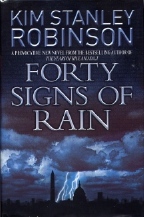Forty Signs of Rain
by Kim Stanley Robinson
Frank Vanderwal, having spent a year at the National Science Foundation (NSF) in canyoneering when he can. Interested in sociobiology, he views both his own behavior and others' as that of primates who evolved on the African savannahs and who are not entirely biologically prepared to live in the urban environment. He considers behaviors in ordinary situations, such as traffic, and in extraordinary situations in light of the game theory decision making strategy known as the prisoner's dilemma.
Anna's husband, Charlie Quibler, feels as urgently as Frank does about environmental issues. He juggles the raising of their two young sons, Nick and Joe, with encouraging Senator Phil Chase and Chase's chief of staff, Roy, to badger the conservatives in Congress about passing legislation to convert the United States to a non-anthropogenic global warming society, to construct carbon sinks, and to work for international cooperation for amelioration of climate change. (It is clear that the President, never named, is George W. Bush; we are told that his predecessor was Bill Clinton; he views climate change as a "downer" and refers to it as "climactic [not climatic] terrorism.")
Anna, a devoted wife and mother, is, in Frank's view, something of an ultra-rationalist; Charlie is amused by her constant search for quantifiable measurements in all parts of her life. She discovers the new Khembali embassy in the NSF building and invites Drepung and Rudra Cakrin to lunch. When they all get along well, and she becomes interested in their concern about the threat of rising sea levels to Khembalung, their small island nation in the Bay of Bengal, she invites them to come for dinner when they all have time.
Leo Mulhouse, a science director at Torrey Pines Generique, a biotechnology startup company in San Diego, searches for therapies for various human diseases. He is alarmed to learn that his boss, Derek, has spent $51 million to buy another company which might (and might not) work in tandem; Torrey Pines has not yet been able to show any profits, which puts them at risk for sale to investors who might care to purchase or even quash any patentable techniques they come up with. He turns out to be right when the company is sold some weeks later. Leo has another worry: his house, located on a cliff over the Pacific, is threatened by coastal erosion.
Frank, eager to return to California, writes an angry denunciation of NSF and leaves it in the in-box of the director, Diane Chang, for her to find the next morning. That evening, he unexpectedly has a romantic encounter with a beautiful woman in a Washington Metro subway elevator when the elevator is stuck between floors. They are released, and she disappears before he can learn her name. Invited to the Quiblers' house to meet the Khembalis, he tells Anna about the woman; she is pleased to find him so excited and talkative, and urges him to track her down.
Frank, thinking that now he might want to stay in D.C., regrets the angry letter about the NSF and decides to break into Chang's office and remove it. Using his climbing skills, he enters the NSF building from the roof, descends through the atrium skylight, manages his way down a large mobile, and gets into Chang's office. The letter, however, is gone; Chang often comes into her office at all hours. Nervous and upset, he returns home. The next day, Chang tells him to prepare a talk for the NSF Board of Directors. Frank realizes that Chang has read his letter, but he tells the directors honestly how he feels about the NSF and urges them to become more daring and more politically active. During the discussion, he sees that many of them feel as he does. Frank accepts an invitation to remain at NSF for another year.
A catastrophic "trigger event" occurs when what Robinson calls the Hyperniño creates an enormous storm on the West Coast. The sandstone cliffs of California begin shelving off into the Pacific Ocean. Leo, now unemployed, witnesses this at his Leucadia, California home and, in the rainstorm, joins members of the United States Geological Survey and an army of volunteers in attempting to shore up the cliffs.
Meanwhile, another enormous storm in the Atlantic creates a flood in Washington. Charlie is trapped at the Capitol Building with other co-workers. They watch as the rain comes down for hours and the National Mall is drowned. "Constitution Avenue looked like the Grand Canal in Venice." The Potomac River and Chesapeake Bay overflow, flooding the city:
When the National Zoo faces rising waters, the Khembalis help the staff to unlock the cages and free the animals. Drepung and his associates arrange for two tigers to be brought to the Quiblers' house, where one is kept in a zoo truck and the other is put into their cellar.
Frank, joining other volunteers in deploying sandbags out in the storm, is amazed to see his mystery woman pass in a boat up the river. Spotting the boat's number, he gets her phone number and calls her; she promises that, after a while, she will call him back.
After days, the storm and the floodwaters subside. Charlie, finally arranging a lift home from the office, says to Senator Chase, "Are you going to do something about global warming now?"
